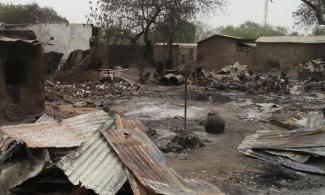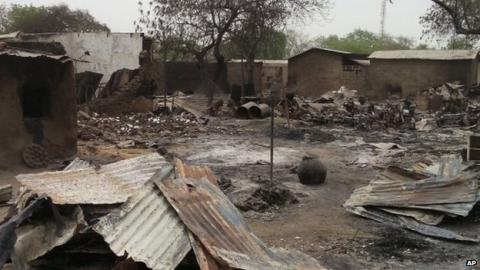
Next month, Nigerians will be voting to decide who becomes their next president. I think that General Buhari’s soaring popularity is a reflection of how disenfranchised some of President Jonathan’s supporter have become with his performance in government over the last 6 years, and very little to do with the quality of the opposition candidate. I fear that, like in 2011, this election has already been decided on emotions rather than substance. But that is not what concerns me today.

On the same day that 18 people were massacred in France by Islamist gunmen, Amnesty international reported the massacre of about 2,000 Nigerians in Baga. There was worldwide outrage and show of solidarity with the French people. However, there was scarcely any mention of the Baga massacre in the media. President Jonathan promptly issued a statement to condemn the Charlie Hebdo attack, and rightly so. But, more than a week later, the president has yet to say anything about the massacre that took place in his own country. Even worse, there are no Nigerians on the streets protesting or standing in solidarity with the people of Baga who have either been killed or forced to flee their homes.
President Jonathan has demonstrated over and over again that he lacks the will power and a strategy to confront, let alone defeat Boko Haram (BH). It took the visit by Malala Yusuf, nearly several months after the Chibok abductions, before the president saw the need to speak to the families of the abducted girls. President Jonathan told world leaders in France at a meeting convened by President Hollande last May that his government would build a wall fence to protect the school from further assaults. Incredible, but this was our president’s response to a question he was asked about the kind of support his government hopes to give the families of the abducted girls and why he had not yet visited the school. (http://youtu.be/ixCIuAHppC4)
As I have said in a previous article for Sahara Reporters, http://bit.ly/1C32mRA, it is evident that the President sees BH as a sectional problem. He body language suggests that he believes BH is a political tool put in place to topple his government. This perfectly explains his lackadaisical attitude to what is arguably Nigeria’s biggest security threat since Independence.
But, how about us, the people? My view is that societies deserve the kind of leadership that they get. Leaders do not drop from the sky – they are a reflection of the society from which they come. We have become accustomed to the atrocities of BH to the point where their nearly weekly massacre of our countrymen hardly elicits any reaction from us. To us, the victims are faceless and represent just another statistic. It appears that our society places very little value on human life. An American or European life is seemingly more valuable than a Nigerian life - little wonder then that the world rallied around France where 18 people were killed but looked away whilst 2,000 Nigerians got butchered! Yet, there is not one Nigerian on the street protesting the massacre and/or demanding action from the government. You see, people can only respect you as much as you respect yourself. Not more.
The problem with Nigeria is . . . . . . . Nigerians. I know how much we expect that a messiah will come to deliver us, but neither president Jonathan nor General Buhari nor anyone else is the messiah. We don’t need a messiah; what we need is a change of attitude and values. Every one of us, that is. We have developed an unproductive habit of relying on supernatural entities to intervene and solve our problems. Every way one turns, one is confronted with such fatalistic pronouncements as: ‘God will do it’, ‘it is the will of God’, ‘it is well’, ‘e go better’, and so on. We actually believe that soliloquy and hunger strikes (aka prayers and fasting) can solve the problems of leadership, poor infrastructure and insecurity that beset our country. We need to realize that these supernatural entities, assuming they even exist, are not going to do for us what we need to, and should do, for ourselves.
At this point, it is pertinent to repeat my old warnings: As experience has shown in Rwanda, Bosnia, Somalia and with ISIS fighters in Iraq, situations like ours can degenerate very rapidly, but lives can be saved if the international community acts decisively and timely. We have a humanitarian crisis developing in Nigeria - whole communities have been burnt down and their population displaced; some of our people have fled into neighboring countries such as Cameroon, Chad and Niger to seek shelter as the Nigerian government does to seem bothered about the plight of its own citizens; thousands have been literally butchered; others have fled to parts of the country that are relatively safe. The dimensions and magnitude of these problems are under-reported by our local media. Sadly, Western journalists have other priorities than Nigeria.
We do not know where or when the next terrorist attacks will take place. But we know they will happen because the ideology that drives these attacks has not been countered. BH has been tremendously emboldened by President Jonathan’s apathy. The president has left us in no doubt that he lacks both the will power and the competence to defeat BH. If the state of insecurity in this nation means anything to Nigerians, then, it is self-evident that President Jonathan does not deserve another term in Aso Rock. And those who think that Lagos and the cities that lie outside the northern geographical zones are immune from BH terrorism should think again. This problem affects us all.
The international community needs to rally round Nigeria. Jihadist terrorism is a global problem and Nigeria needs all the help it can get to confront BH jihadists. If the world does not act now, it will be forced to do so at a later day when the threats are even more difficult to deal with. The time to act is now!
Ijabla Raymond, a medical doctor of Nigerian heritage writes from the UK.
Contact: [email protected]